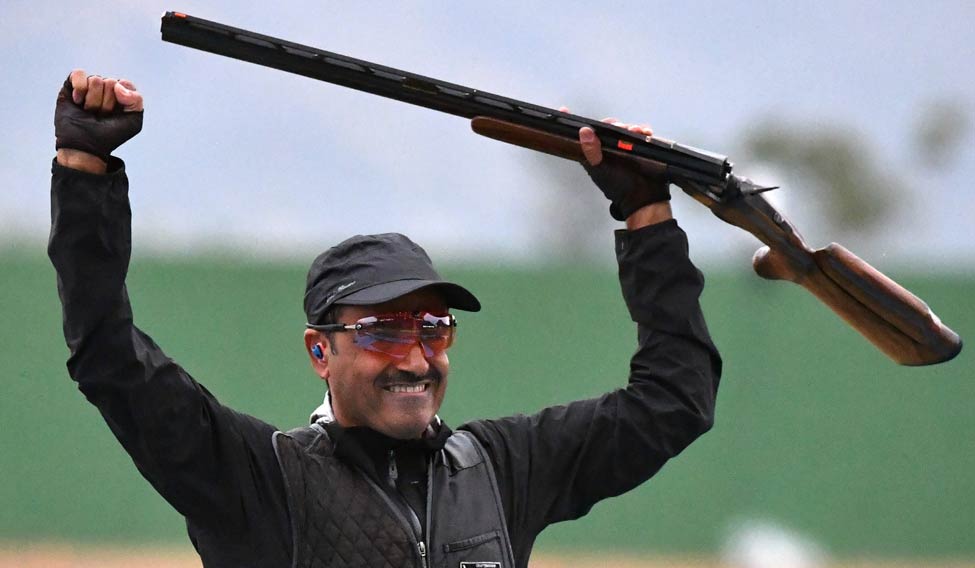Nothing beats the sense of pride and patriotism that comes with standing on the podium, soaking in your national anthem, as you watch your country's flag being hoisted for your achievement.
Unfortunately, for gold medallist Fehaid Al-Deehani, that was not to be. Beating Marco Innocenti in the final of the men's double trap event, the 49-year-old became the first person in Olympic history to win a gold medal as an independent athlete.
Al-Deehani is an officer in the Kuwait army, whose country has been banned from competing this year, after the International Olympic Committee (IOC) accused its government of interfering in activities of its national Olympic committee. The ban had resulted in forcing Al-Deehani and eight other Kuwaitis to compete under the Olympics flag as independent athletes.
The marksman was asked to carry the Olympic flag during the opening ceremony as he led the other independent participants onto the field, but refused to do so as he felt that it would be an insult to his country.
He had earlier won two bronze medals—at the 2000 Sydney Games for the same event and at the 2012 London Games in single trap. Incidentally, these are the only medals that Kuwait has ever won at the Olympics.
Al-Deehani was a broken man when he stood on the podium after his event, as it was the Olympic flag and anthem, and not his country's, that marked his victory. Dressed in black, the sharpshooter thumped his chest after sealing the victory. He later told the media that the gesture was for his countrymen.
Independent athletes are not to be confused with the fabled team of refugees that is also participating under the Olympic flag this time. The refugee team, a first of its kind, is composed of 10 athletes from four countries. The IOC has allowed the refugees to compete, not as independent athletes, but as a team of their own.
Russian athletes, too, had faced the possibility of participating as independent athletes, when it seemed like the country would be banned for state-sponsored doping charges. The IOC, however, allowed many Russian athletes to compete as a united team in Rio.
Other instances
The Rio Games is not the first edition to feature independent athletes. Even Indian athletes have taken part in the international event independently—at the 2014 Winter Games.
During the 1992 Summer Olympics in Barcelona, athletes from Yugoslavia and Macedonia competed as independent Olympic participants. 58 competitors (52 from Yugoslavia and 6 from Macedonia) took part in 54 events in 13 disciplines. Three athletes won medals (one silver and two bronze), all in shooting.
The Unified Team—the name used for the sports team of the former Soviet Union—were a separate team at the 1992 Winter Games in France and the Summer Barcelona Games. Following the break-up of the Union, the national Olympic committees were yet to be formed and so the Olympic flag and anthem were used instead.
At the Winter Games, the Unified Team consisted of 6 of the 15 former Soviet states: Russia, Ukraine, Kazakhstan, Belarus, Uzbekistan and Armenia. The team won nine gold, six silver and eight bronze to finish second highest in the medals tally.
By the time the Summer Olympics that year began, the countries of the Unified Team had formed their own Olympic committees, but nevertheless fielded a joint team as the team had played together for the qualifying rounds. But unlike the Winter Games, the flags and anthems of the new states were used for the podium finishers. The team racked up 45 gold, 38 silver and 29 bronze to top the medals table.
For the 2000 Sydney Summer Games, four athletes from the war-torn former Portuguese territory of East Timor competed independently, as the country had not disassociated from Indonesia until 2002. The country later made its first official appearance at the 2004 Athens Games.
At the 2012 London Olympics, four participants from the former Netherlands Antilles and the newly formed state of South Sudan took part independently. Three athletes from the kingdom of Netherlands Antilles were allowed to participate after the nation was dissolved in 2010, while South Sudan, which had not formed an Olympic committee by then, had one representative.
Three Indian athletes took part as independents in the 2014 Sochi Winter Games, as government interference in the Indian Olympic Association had led to the latter's suspension by the IOC. However, four days into the event, the suspension was lifted and the two athletes who had events remaining were allowed to compete under the Indian flag. India has never won a medal at the Winter Games.




